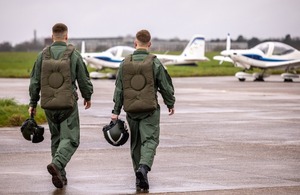First Ukrainian pilots graduate from RAF flight training
The first Ukrainian pilots to have undergone intensive training under the guidance of Royal Air Force instructors have graduated from flight school.

Ukrainian pilots walking towards their aircraft UK MOD © Crown copyright 2024
The 10 pilots received basic flying, ground school and language training in the UK and will one day form the first line of defence in protecting Ukraine’s skies from Putin’s forces.
The cohort will now move to advanced flying training provided by the French Air Force before learning to fly F-16 fighter jets.
This effort is a key UK contribution to the Air Capability Coalition, co-led by the United States, Denmark and the Netherlands, which is helping build an air force consisting of modern fighter jets to form the cornerstone of Ukraine’s armed forces. The capability coalitions were established last year to provide a long-term commitment to supporting Ukraine’s armed forces, with the UK co-leading the maritime and drone coalitions.
Secretary of State for Defence, Grant Shapps said:
I would like to congratulate these brave pilots on completing their initial training here in the UK. Thanks to the world-renowned skills of RAF, these pilots have received some of the best training available and are now a step closer to joining the fight against Putin’s illegal invasion.
The UK has led the way in building Ukraine’s air capabilities over the last two years, enhancing its aircraft with additional equipment, as well as being the first nation to provide long-range cruise missiles to Ukraine.
Ukraine has been using its Air Force to devastating effect, degrading the Russian Black Sea Fleet and severely damaging its Headquarters. This milestone is another step forward for Ukraine’s aerial capabilities - together with our allies we are showing that we will continue to stand by Ukraine’s side.
A modern air force will provide a significant boost to Ukraine’s capabilities, which currently consist of Soviet-era aircraft, acting both as a strong deterrent and highly effective countermeasure against Putin’s own forces – limiting their ability to attack targets within Ukraine.
While the UK does not operate the F-16 fighter jets which Ukraine has chosen to form the core of its modernised air force, the Prime Minister and Defence Secretary have consistently urged partners and allies to back an international programme to provide training and jets to the Ukrainians, which is scheduled to deliver the first F-16s to Ukraine by summer 2024.
As part of their training, the pilots were taught general aircraft handling, flying by the aircraft’s instruments, low level navigation and advanced formation flying by experienced RAF instructors. They also received English language training to assist in their training and to boost interoperability with NATO air forces – with English the standardised international flight language.
Having worked closely with the French Air Force to align our training programmes, the pilots will now continue to France to conduct advanced flight training before they progress to training on the F-16 aircraft itself.
The trainees join more than 60,000 Ukrainians who have received training in the UK since Putin first ordered the invasion of Crimea in 2014, including 36,000 recruits since 2022 through Operation Interflex.
One of the Ukrainian pilots said:
I have enjoyed being in the United Kingdom and being part of this training program. The course has been challenging and enjoyable It has made me a better pilot. I am grateful to the UK for its support to Ukraine and I am personally grateful to the Royal Air Force instructors for preparing me for the future.
The Prime Minister confirmed the UK’s intent to support the Air Capability Coalition last year with basic flying training, and the RAF will continue this support to fresh cohorts of Ukrainian pilots and ground crew.
The UK remains fully committed to supporting Ukraine, with £2.5bn already earmarked for further military support through 2024, including a recently announced £325m of bilateral support to provide more than 10,000 advanced drones, and £245m to continue to provide much-needed artillery ammunition.